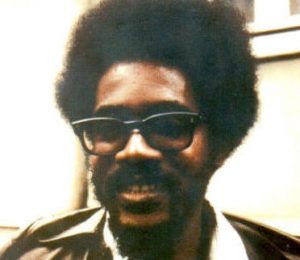Walter Rodney
“Walter Anthony Rodney was born to Edward and Pauline Rodney in Georgetown, Guyana on March 23, 1942. He developed into an intellectual and scholar and is recognized as one of the Caribbean’s most brilliant minds.”
“In 1968, while a UWI professor in Jamaica, he joined others to object to the socio-economic and political direction of the government. Unlike his counterparts, however, Rodney involved the working class, including the Rastafarians (one of Jamaica’s most marginalized groups) in this dialogue. His speeches and lectures to these groups were published as Grounding with My Brothers, and became central to the Caribbean Black Power Movement. Rodney’s activities attracted the Jamaican government’s attention and after attending the 1968 Black Writers’ Conference in Montreal, Canada he was banned from re-entering the country. This decision was to have profound repercussions, sparking widespread unrest in Kingston.”
“In 1974, Walter returned to Guyana to take up an appointment as Professor of History at the University of Guyana, but the government rescinded the appointment. But Rodney remained in Guyana, joined the newly formed political group, the Working People’s Alliance. Between 1974 and 1979, he emerged as the leading figure in the resistance movement against the increasingly authoritarian PNC government. He gives public and private talks all over the country that served to engender a new political consciousness in the country. During this period he developed his ideas on the self-emancipation of the working people, People’s Power, and multiracial democracy.”
“On Friday, June 13, 1980, Walter Anthony Rodney was assassinated by a bomb in Georgetown, Guyana. He was 38 years old.

“The Groundings with my Brothers” (1969)
Citation: Rodney, Walter. The Groundings with My Brothers. Bogle-L’Ouverture Publications, 1975.
Info: In this classic work published in the heady days of international black power, Groundings with My Brothers details the global circulation of emancipatory ideas, but also offers first-hand reports of Rodney’s mass movement organizing. Introduced and contextualized by leading Caribbean scholar-activists, this updated edition brings Rodney’s legacy to a new generation of radicals.

“A History of the Guyanese working people, 1881-1905” (1981)
Citation: Rodney, Walter. A History of the Guyanese Working People, 1881-1905. Johns Hopkins University Press, 1981.
Info: This comprehensive examination encompasses the history of African and Asian immigration into Guyana, the interaction of ethnic groups, the impact of British colonialism, economic and political constraints on the working class, and the social life of the masses.

“Black Power, Decolonization, and Caribbean Politics: Walter Rodney and the Politics of The Groundings with My Brothers” (2009) by Anthony Bogues
Citation: Bogues, Anthony. “Black Power, Decolonization, and Caribbean Politics: Walter Rodney and the Politics of The Groundings with My Brothers.” Boundary 2, 36(1), 127-47. 2009.

“Walter Rodney’s Pan-African nationalism” (2008) by K. Young
Citation:Young, K. “Walter Rodney’s Pan-African Nationalism.” Peace Review -Palo Alto Then Abingdon-, vol. 20, no. 4, 2008, pp. 487–495.

“Walter Rodney’s Intellectual and Political Thought” (1998) by R. C Lewis
Citation: Lewis, Rupert. Walter Rodney’s Intellectual and Political Thought. Press University of the West Indies, 1998.
Info: “Placing Walter Rodney’s (1942-1980) work in the larger tradition of West Indian involvement with continental Africa, this study traces the evolution of Rodney’s political ideas through examination of his life, his writings on Africa and the Caribbean, and his political practice”.

“Race and Class in the Postcolonial Caribbean: The Views of Walter Rodney” (1996) by Alex Dupuy
Citation: Dupuy, Alex. “Race and Class in the Postcolonial Caribbean: The Views of Walter Rodney.” Latin American Perspectives, vol. 23, no. 2, 1996, pp. 107–129.

“Walter Rodney and the Question of Power” (1982) by C.L. R James
Citation: James, C.L.R. “Walter Rodney and the Question of Power.” Race Today Publications, 1982.

“Guyana’s Socialism: An Interview with Walter Rodney” (1976) by Colin Prescod
Citation: Prescod, Colin. “Guyana’s Socialism: An Interview with Walter Rodney.” Race and Class, 18(2), 1976.
“If there is to be any proving of our humanity it must be through revolutionary means.”
“Colonialism had only one hand — the taking hand.”
“Colonial education was education for subordination, exploitation, the creation of mental confusion, and the development of underdevelopment.”
“Africa developed Europe at the same rate that Europe underdeveloped Africa.”
